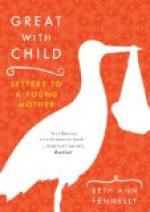“If I could prevail, no child should ever be crammed with any unnatural mixture, till the provision of nature was ready for it; nor afterwards fed with any ungenial diet whatever, at least for the first three months; for it is not well able to digest and assimilate other elements sooner.
“I have seen very healthy children that never ate or drank anything whatever but their mother’s milk, for the first ten or twelve months. Nature seems to direct to this, by giving them no teeth till about that time. The call of nature should be waited for to feed them with anything more substantial; and the appetite ought ever to precede the food—not only with regard to the daily meals, but those changes of diet which opening, increasing life requires. But this is never done, in either case; which is one of the greatest mistakes of all nurses.
“When the child requires more solid sustenance, we are to inquire what and how much is most proper to give it. We may be well assured there is a great mistake either in the quantity or quality of children’s food, or both, as it is usually given them, because they are made sick by it; for to this mistake I cannot help imputing nine in ten of all their diseases.
“As to quantity, there is a most ridiculous error in the common practice; for it is generally supposed that whenever a child cries, it wants victuals: it is accordingly fed ten or twelve or more times in a day and night. This is so obvious a misapprehension, that I am surprised it should ever prevail.
“If a child’s wants and motions be diligently and judiciously attended to, it will be found that it never cries, but from pain. Now the first sensations of hunger are not attended with pain; accordingly, a very young child that is hungry will make a hundred other signs of its want, before it will cry for food. If it be healthy, and quite easy in its dress, it will hardly ever cry at all. Indeed, these signs and motions I speak of are but rarely observed, because it seldom happens that children are ever suffered to be hungry.[Footnote: That which we commonly observe in them, in such cases, and call by the name of hunger, the Doctor, I suppose would regard as morbid or unnatural feeling, wholly unworthy of the name of HUNGER.]
“In a few, very few, whom I have had the pleasure to see reasonably nursed, that were not fed above two or three times in twenty-four hours, and yet were perfectly healthy, active, and happy, I have seen these signals, which were as intelligible as if they had spoken.
“There are many faults in the quality of children’s food.
“1. It is not simple enough. Their paps, panadas, gruels, &c. are generally enriched with sugar, spices, and other nice things, and sometimes a drop of wine—none of which they ought ever to take. Our bodies never want them; they are what luxury only has introduced, to the destruction of the health of mankind.
“2. It is not enough that their food should be simple; it should also be light. Many people, I find, are mistaken in their notions of what is light, and fancy that most kinds of pastry, puddings, custards, &c. are light; that is, light of digestion. But there is nothing heavier, in this sense, than unfermented flour and eggs, boiled hard, which are the chief ingredients in some of these preparations.




